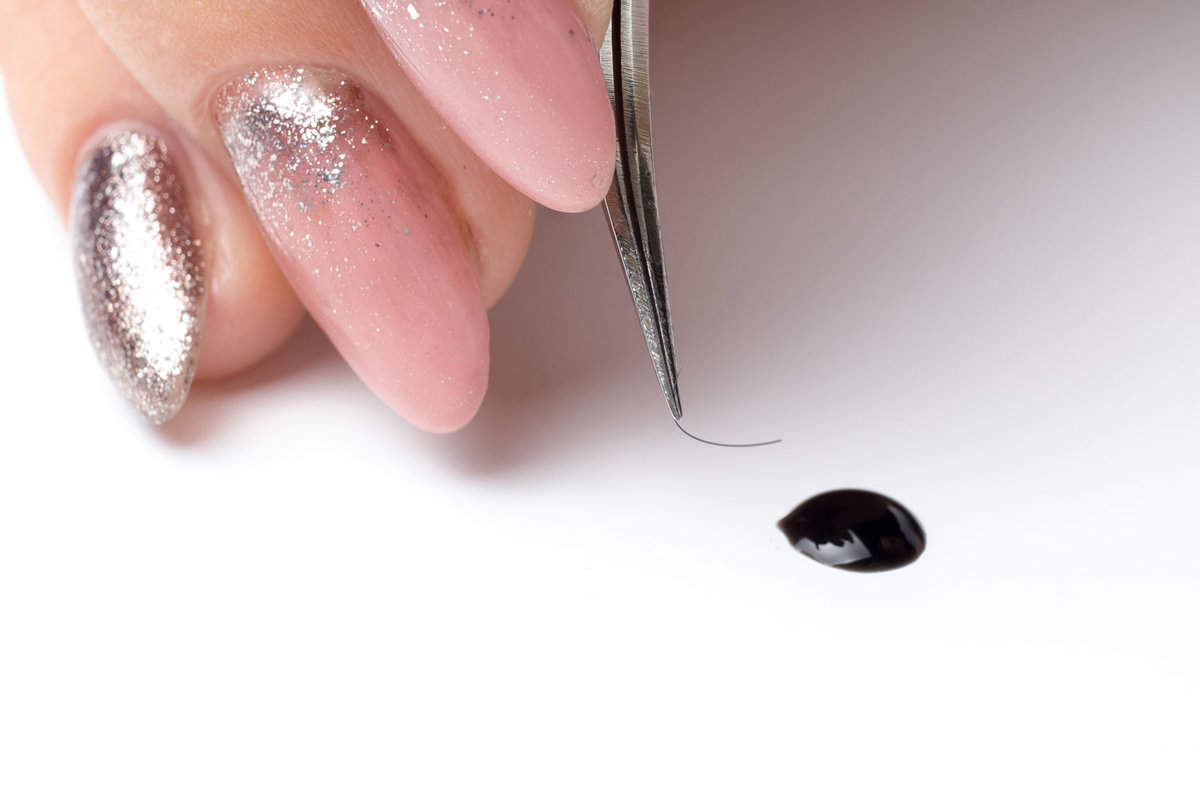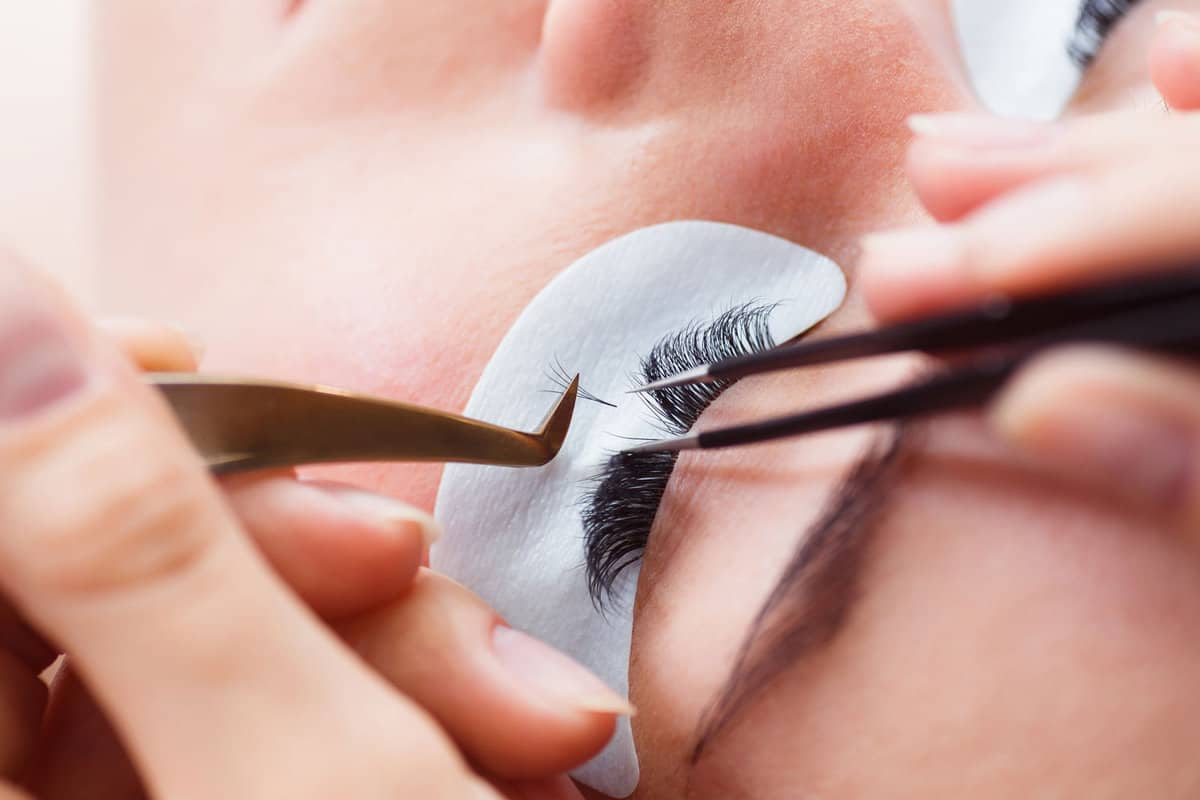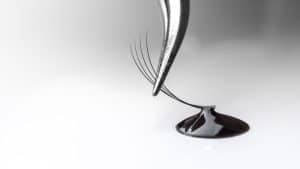Have you ever wondered if there is an eyelash glue without cyanoacrylate?
Cyanoacrylate is a common ingredient in most eyelash glues, but it can cause irritation and allergic reactions in some people.

This article may include affiliate links and elements that were carefully created by our team using advanced ai to help you envision the best style advice.
If you have sensitive eyes or are allergic to cyanoacrylate, finding the right eyelash glue can be a challenge.
Fortunately, alternative eyelash glue options that do not contain cyanoacrylate are available.
Let's find out which one aligns best with your unique needs and preferences!
What Is Cyanoacrylate?
If you are looking for eyelash glue without cyanoacrylate, it is important to understand what cyanoacrylate is and why it is commonly used in lash adhesives.
Cyanoacrylate is a type of fast-acting adhesive that is commonly used in industrial, medical, and household applications.
It is also used in many lash adhesives because of its strong bonding properties.
Cyanoacrylate is made up of various esters of cyanoacrylic acids. When exposed to water, the acryl groups in the resin rapidly polymerize to form long, strong chains.
This reaction creates a strong bond between the lash extension and your natural lash.
Potential Issues With Cyanoacrylate In Eyelash Glues
While cyanoacrylate is an effective adhesive, it does have some minor toxicity. Here's a closer look at the challenges associated with this ingredient:
Irritation
One of the primary concerns with cyanoacrylate is its potential to irritate.
In its liquid state or when its vapors are inhaled, cyanoacrylate has been identified to cause some irritation to the skin, eyes, and mucous membranes.
Allergic Reactions
Beyond mere irritation, the adhesive properties of the glue, which prominently feature cyanoacrylate, can lead to allergic responses.
This can manifest in various ways, making it crucial for users to conduct patch tests or seek alternatives if they're prone to allergies.
Cornea Damage
The removal process of eyelash extensions, which requires solvents, can inadvertently harm the eye's cornea.
Given the eye's delicate nature, utmost care is required during both the application and removal of extensions.
Increased Risk Of Infections
With the addition of eyelash extensions, there's an elevated risk of encountering bacterial and fungal eye infections.
The extensions can act as a trap for debris and microbes, potentially leading to harmful complications.
Occupational Concerns
Professionals in the beauty industry should also exercise caution.
The application process of eyelash extensions can release cyanoacrylates into the surrounding atmosphere, posing a threat to occupational asthma and rhinitis.
Do All Lash Glues Have Cyanoacrylate?
The vast majority of lash glues on the market contain cyanoacrylate.
However, with rising consumer awareness and demand for alternative products, some manufacturers are exploring different formulations.
We've identified four specific products that actively market themselves as "Cyanoacrylate-Free" (more on this below).
This indicates a possible evolution in the eyelash adhesive market to accommodate those with sensitivities or particular ingredient preferences.
Continue reading: How To Know If Lash Glue Is Bad?
Eyelash Glue Alternatives Without Cyanoacrylate
As mentioned, after extensive research, we've pinpointed a couple of products that claim to be cyanoacrylate-free, tailored for those with sensitivities.
It's worth noting that currently, the majority of these products can only be purchased directly from their official websites.
1. Lashify DIY Eyelash Extensions
Lashify allows individuals to apply individual lash segments. It's promoted as a cruelty-free and vegan option, appealing to those with ethical beauty considerations.
When applying, make sure to adhere to the specific instructions provided by Lashify to ensure a safe and effective application.
For a closer look, click the link below.
2. True Glue Lash Extension Adhesive
The ingredients list for this adhesive includes vegan starch (distarch phosphate), Soy Alkyd, and a less than 1% concentration of Sodium Lauryl Sulfate.
Marketed as an all-natural salon-grade adhesive, it claims to have no toxic chemicals, ensuring reduced chances of redness or watery eyes.
Its advertised duration is up to 8 weeks with proper care.
You can check the True Glue Lash Extension Adhesive here.
3. Lost Artistry Cyano-Free Lash Glue
According to their MSDS, this adhesive lists its ingredients as Polyacrylate, Ethanol, Deionized Water, Benzoic Acid, and Pigment.
Similar to True Glue, it’s also positioned as a suitable option for those allergic or sensitive to cyanoacrylate.
It's formulated to be oil-resistant and to exclude common allergens found in other eyelash extension glues, with a claim of lasting up to 8 weeks with appropriate care.
Lost Artistry Cyano-Free Lash Glue is available for purchase here.
4. Black Magic Lash Adhesive
The Black Magic eyelash glue claims to be suitable for sensitive eyes and is water-based.
It boasts a 6-8 week retention period, reducing the need for frequent reapplication. It aligns with ethical choices as it's cruelty-free, vegan, and latex-free.
We couldn't find comprehensive information about its ingredients, so it's advisable to conduct thorough research and seek professional advice before use.
You can check the product details and availability on the manufacturer's website.
Are There Other Options Beyond These Products?

Absolutely! If you're wary of using specific eyelash glues due to their ingredient composition or for any other reason, there are several other methods for you:
Magnetic Eyelashes
Instead of adhesive, these eyelashes use tiny magnets to secure themselves to your lash line, providing a seamless appearance.
An added advantage is the reduced risk of irritation since no glue is used. A popular choice on Amazon is the Luxillia Magnetic Eyelashes.
Continue reading: Can You Use Glue On Magnetic Lashes?
Volumizing Mascara
If you're not keen on false lashes, volumizing mascara can be a simple yet effective solution.
Designed to boost the volume and length of your natural lashes, these mascaras create the illusion of fuller lashes without the need for adhesives or extensions.
L’Oréal Paris Voluminous Original Mascara is a fan-favorite on Amazon for this purpose.
DIY Eyelash Glue
If the options above do not work for you, making eyelash glue at home is also possible. Here’s a simple method:
- Mix equal parts of sugar, honey, and water in a saucepan.
- Heat the mixture until the sugar dissolves completely.
- Allow it to cool and transfer to a small container.
- Apply a cotton swab or thin brush to the lash band.
However, this might not provide as strong an adhesive hold as commercial products, so it's best for short-term wear.
Are Cyanoacrylate-Free Glues As Effective?
Cyanoacrylate-free glues might be a viable option for you if you're seeking alternatives for eyelash applications.
These glues are oil-resistant, with some manufacturers boasting a retention period of up to eight weeks. However, you should note that the effectiveness can vary.
They might not consistently match the bond time or strength you would find with cyanoacrylate-based glues.
As you explore your options, consider the potential variability in effectiveness to make the best choice for your needs.
You might also like: Why Is My Lash Glue Not Sticking? [Common Reasons and Solutions]
Tips For Using And Choosing Cyanoacrylate-Free Glues
Here are some tips to help you choose and use cyanoacrylate-free glues:
- Look for a glue that is specifically labeled as cyanoacrylate-free. This will ensure you get a product free of this potentially irritating ingredient.
- Check ingredient labels closely for potential irritants, even in products claiming to be cyanoacrylate-free. Prioritize thorough label reading before buying.
- Before applying the glue to your eyelashes, perform a skin patch test to check for allergies or sensitivities.
- Follow the instructions carefully. Different cyanoacrylate-free glues may have other application methods, so read and follow the instructions.
- Be patient. Cyanoacrylate-free glues may take longer to dry and require more time for the lashes to set.
How Do I Know If I’m Allergic To Cyanoacrylate?
An allergic reaction can cause redness, itching, and bumps along the lash line. To determine if you're allergic, you can request a patch test from your lash technician.
During a patch test, a small amount of adhesive is applied to your skin behind your ear or on your inner arm.
If you experience any redness, itching, or swelling in the area, you are likely allergic to cyanoacrylate.
It is important to note that even if you have used lash extensions before without any issues, you can still develop an allergy to cyanoacrylate over time.
If you experience any symptoms of an allergic reaction after receiving lash extensions, it is important to seek medical attention and remove the extensions immediately.
How Do I Get Rid Of Cyanoacrylate Allergy?
If you are experiencing an allergic reaction to eyelash glue containing cyanoacrylate, you can take a few steps to alleviate the symptoms and prevent future reactions.
Remove The Eyelash Extensions
The first step is removing the eyelash extensions causing the reaction. This will help reduce the exposure to the cyanoacrylate and prevent further irritation.
Take Antihistamines
Antihistamines can help reduce the symptoms of an allergic reaction, such as itching and swelling. Over-the-counter antihistamines like Benadryl or Zyrtec can be effective.
Apply A Cold Compress
Applying a cold compress to the affected area can help reduce swelling and soothe the skin. You can use a cold washcloth or a bag of frozen vegetables wrapped in a towel.
Use A Corticosteroid Cream
A corticosteroid cream may be necessary to reduce inflammation and itching if the reaction is severe.
This should be used under the guidance of a healthcare professional.
Avoid Cyanoacrylate
To prevent future reactions, it is important to avoid eyelash glue containing cyanoacrylate.
Look for alternative glues labeled "cyanoacrylate-free" or "hypoallergenic."
Final Thoughts
Finding an eyelash glue without cyanoacrylate is possible.
As we have seen, several options on the market are safe and effective for those with sensitive eyes or allergies.
When choosing an eyelash glue, it is essential to consider the ingredients and their potential side effects.
It is also important to follow the manufacturer's instructions carefully to ensure the best results and avoid any adverse reactions.
Remember that using an eyelash glue without cyanoacrylate may require a slightly different application process or take longer to dry.
However, the benefits of avoiding potential allergic reactions or irritation make it worth the extra effort.




![Applying lash glue onto fake eyelashes, Why Is My Lash Glue Not Sticking? [Common Reasons and Solutions] - 1600x900](https://stylecheer.com/wp-content/uploads/2023/09/shutterstock_1059533828-300x169.jpg)
![Pouring black lash glue onto a small mat, What Glue Do Lash Techs Use? [A Guide to Lash Extension Adhesives] - 1600x900](https://stylecheer.com/wp-content/uploads/2023/09/shutterstock_1541038103-300x169.jpg)
